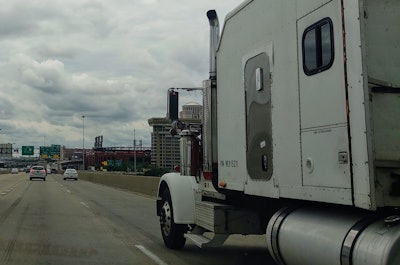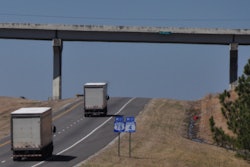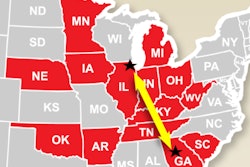
Longtime independent owner-operator and business consultant W. Joel Baker has seen it time and again. A broker he's about to do business with asks to be added as an "additional insured" on Baker's business's own insurance policy. Every time he asks just why, furthermore, he gets one of two answers, as he made note of in this blog post at his LearntoTruck.com website.
- Adding the broker will allow it to keep tabs on the carrier's required policy's currency and renewal deadlines.
- "It’s just what our company requires from carriers and truck owners."
As the second of these suggests, the practice has been so common throughout recent history as to go unquestioned by the minds of young brokers and agents, and in many cases the owner-operators working with them to keep the trailer full. Baker certainly started out accepting of brokers' reasons for asking for it years ago, when he first started getting the requests. But "the more I found out" about the potential ramifications of essentially giving third parties insurance via his policy, "the more I didn't like it at all and quit doing it," he said. "It's a terrible practice to get into" for a truck owner, he believes.
It's not just brokers who might attempt this, but also direct shipper customers, for similarly stated reasons. Yet consider this hypothetical Baker offers as a cautionary tale.
 W. Joel Baker, pictured behind his reefer trailer some years ago when I caught up with him at a Nashville, Tennessee-area cross-dock. He maintains his carrier authority to this day but has sold his equipment and transitioned into work as an insurance agent, operating that business via TruckOwnersInsurance.com.
W. Joel Baker, pictured behind his reefer trailer some years ago when I caught up with him at a Nashville, Tennessee-area cross-dock. He maintains his carrier authority to this day but has sold his equipment and transitioned into work as an insurance agent, operating that business via TruckOwnersInsurance.com.

The customer then claims "hey, we didn't give you that door," saying the owner-op misheard 37 instead of 57. "It's not our fault. You need to contact your insurance company."
The owner-op submits a physical damage claim to his own insurance, yet manages to provide sufficient proof to the insurance company that the failed dock overhang was in fact the one that the shipper sent him to. The insurance company says, "Hey, ACME Widgets Inc., you’re responsible. Pay up or we'll sue" for the cost of the loss.
Because the owner-op added his customer as an additional insured to the policy, however, ACME Widgets' crafty attorneys now believe they have an out from accepting responsibility, Baker said: "You are our insurance company, too, on this same policy," the shipper says.
Like it or not, the argument goes, because ACME widgets is an additional insured on the owner -op’s policy ACME widgets cannot be sued by the owner-op’s insurance company even if they are liable for the damage. Additional harm is done to the owner-op when it’s time for renewal. Because the claim now appears on the owner-op’s insurance history, it adversely effects the renewal premium. Had the insurance company been able to recoup its losses via the customer's general liability, that wouldn't be the case.
Baker emphasizes this rationale around his refusal to grant the additional-insured ask, whether it's coming from a direct customer or a broker: "If you’re not willing to accept responsibility for your actions" and secure that appropriately with your own insurance for potential liabilities, "then you’re not a company I’m comfortable doing business with."
In the case of a broker asking to be added as an additional insured, keep in mind, too, that given possible affiliations that broker has with bigger businesses, you may be giving away more than you think.
Baker's sold his Class 8 these days but maintains his carrier authority as a way of keeping abreast of the realities of the trucking business in efforts at mentoring others starting out trucking via LearntoTruck.com website. When he was more actively hauling, he had a direct contract with a produce company that created a brokerage division in what he saw as an effort to keep more of the rate for themselves. Adding that broker as an additional insured, he said, might then also have had the effect of insuring the parent as well. While "brokers themselves aren't required to have insurance," he noted, "if they're brokering their parent company's freight" you could similarly hamstring yourself and your insurer's ability to recoup damages incurred at one of that company's facilities as well.
Say you brokered a load into that parent company's facility to unload. There, door 37 doesn't have a malfunctioning overhang, but the dock man directs you to the door nonetheless and says, "We’ll let you know when it’s empty." Time goes by, however, and he comes back out and says he's having issues getting your load locks out and that you need to come up there and help.
You get in there and a forklift operator runs you over, necessitating a hospital visit. The receiver doesn't want to cover you, stating that you violated their policy prohibiting drivers on their docks, so you file the claim on your commercial auto liability insurance under the medical payments section. Your insurance company hears your story and goes to that receiver, with which your broker is affiliated, demanding recompense or they'll sue. They say, "Nope, nope, we’ve got it right here – we're an additional insured."
Longtime transportation attorney Henry Seaton included the additional insured ask as one of his Dirty Dozen (now well more than a dozen, in fact) risk-transfer contract practices carriers should do all they can to avoid. Those are featured in his "Rules of the Road" book compiling a variety of contract considerations he's accumulated over years representing carriers, intermediaries and others.
"If a shipper demands to be named as 'additional insured' on policies," he wrote there, "insist on a specific policy endorsement naming that shipper as an additional insured only to the extent that the liability arose out of the carrier's ongoing operations performed for that insured. If you must name a shipper as an additional insured, be sure to recover from the shipper the additional premium cost, if any, and to include a proper broad-form endorsement in the policy."
Costs, as he suggested, may not be there, but Baker noted one insurer he's aware of charges a flat nominal fee for an addition like that.
[Related: Beware what you sign with brokers: Freight-payment offsetting of cargo claims a ‘sucker’s game’]
As an alternative to adding insureds, Seaton also writes in his book, carriers can simply warrant in contracts that it holds "the requisite insurance, that you are an independent contractor, and that you will provide certificates of insurance to the shipper or broker upon request."
Take any request for additional insured status directly to your insurance underwriter for comment, too, he added, given not all insurers agree "about the coverage a shipper or broker is afforded, if any," based on being added.
Obviously, finally, don't "sign any contract that includes promised coverage that the underwriter has not expressly approved," Seaton wrote.
Baker takes it further and draws a line in the sand on the issue. "My own solution is [saying] 'I won’t do business with you,'" he said. "The more truck owners that make that decision, that would put an end to it."
See you at Walcott?
That's right, owner-ops, if you're planning on showing your truck or just stopping in at Iowa 80 this week, don't be a stranger. Hit me with an email or call and I'd be happy to meet up, as always, with a reader! Meantime, keep the shiny side up and we'll see you in the Midwest. Hopeful for good weather -- certainly cooler than it's been here in Nashville ...










